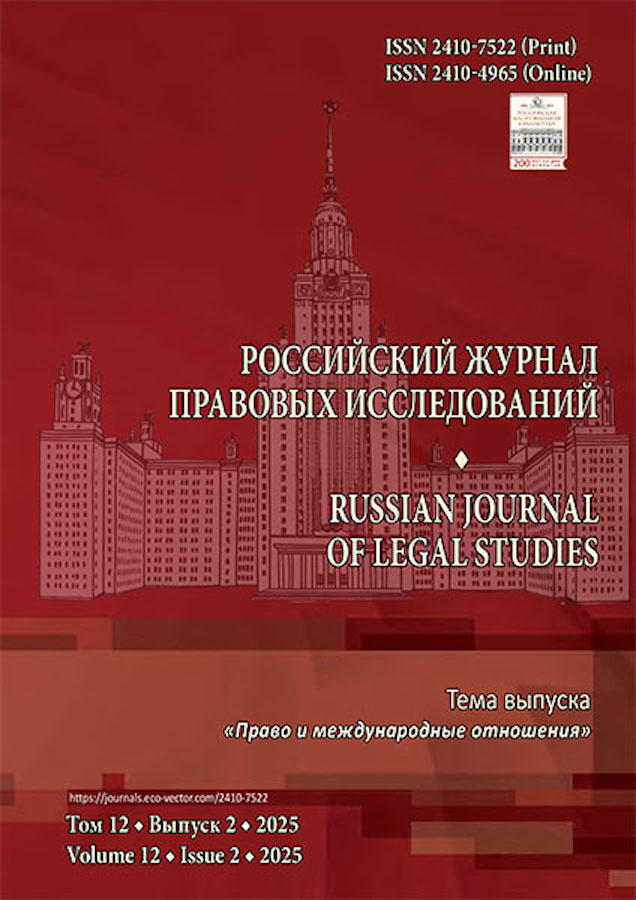Meaning and Place of Arraignment in Russian Criminal Proceedings
- 作者: Polyakov D.A.1
-
隶属关系:
- Institute of Legislation and Comparative Law under the Government of the Russian Federation
- 期: 卷 12, 编号 2 (2025)
- 页面: 105-112
- 栏目: Criminal law
- ##submission.dateSubmitted##: 17.06.2025
- ##submission.dateAccepted##: 19.06.2025
- ##submission.datePublished##: 18.07.2025
- URL: https://journals.eco-vector.com/2410-7522/article/view/684864
- DOI: https://doi.org/10.17816/RJLS684864
- EDN: https://elibrary.ru/GYOBAP
- ID: 684864
如何引用文章
详细
Despite the fact that today the Russian legislators has refused to define the legal concept of arraignment, this category is identified in the doctrine and has in fact been retained in criminal proceedings, albeit in a modified form. However, arraignment plays a special role as an intermediate link between the preliminary investigation and court proceedings, and their differences determine its transitional nature and complexity of creating a proper framework. In addition, on the one hand, arraignment provides an important guarantee for the accused in a criminal case, i.e. a guarantee that they will not be a defendant in court proceedings, which are generally open, without sufficient grounds for doing so and, on the other hand, it is directly related to respecting the rights of the victim and implementation of the public interest in criminal proceedings with an opportunity to solve individual issues related to evidence in a criminal case. Due to complexity of legal regulation of arraignment relations, approaches to their regulation have repeatedly changed; whereas the doctrine still discusses the key issues of the role, objectives, and the model of arraignment in Russian criminal proceedings. This paper analyzes arraignment in Russian criminal proceedings in relation to preliminary investigation and court proceedings, highlights the objectives and key elements of arraignment, and concludes that its role and meaning are predetermined by ensuring successful court proceedings, protecting an individual and preventing initiating of court proceedings in relation to the accused.
全文:
作者简介
Dmitriy Polyakov
Institute of Legislation and Comparative Law under the Government of the Russian Federation
编辑信件的主要联系方式.
Email: d_polyak99@mail.ru
ORCID iD: 0009-0002-4801-448X
俄罗斯联邦, Moscow
参考
- Golovko LV. Criminal proceedings in the context of ongoing judicial reform. Zakon. 2019;(4):67–82. EDN: XZXYSV
- Arsen'ev KK. Bringing to trial and the further course of the criminal case before the start of the judicial investigation. Moscow: Kniga po Trebovaniyu; 2024. 236 p. (In Russ.)
- Belkin AR. Imperfect procedural regulation of individual consequence, governmental actions and attempt to optimize the complex methodological and tactical means of investigation of crimes. Legal science and practice: journal of Nizhny Novgorod Academy of the Ministry of Internal Affairs of Russia. 2016;(4):57–63. EDN: XHSVFZ
- Judicial statutes of November 20, 1864: with a statement of the reasoning on which they are based published by the State Chancellery: part 2: The Statute of Criminal Proceedings. 2nd ed. Saint Petersburg: Tipografiya 2 otdeleniya Sobstvennoi E.I.V. Kantselyarii; 1867. 523 p. (In Russ.)
- Gal'perin IM, Lukashevich VZ. Bringing to trial on Soviet criminal procedure law. Moscow: Yuridicheskaya literatura; 1965. 150 p. (In Russ.)
- Shcheglovitov IG. The existing systems of bringing to trial in the most important criminal cases. Saint Petersburg: Slovo; 1902. 32 p. (In Russ.)
- Shifman ML. Bringing to trial should become a function of the prosecutor's office: (towards the development of codes). Sotsialisticheskaya zakonnost'. 1946;(10):13–16. (In Russ.)
- Chel'tsov MA. Bringing to trial. 2nd ed. The library of the people's court and the people's Assembly. Moscow: Yurizdat; 1944. 24 p. (In Russ.)
- Pechegin DA, Beskhlebnyi SN. Bringing to justice in the criminal procedure: theoretical aspects. Russian Journal of Legal Studies (Moscow). 2022;9(4):95–102. EDN: QWETYM doi: 10.17816/RJLS119846
补充文件






